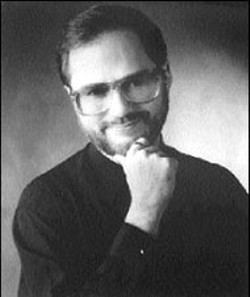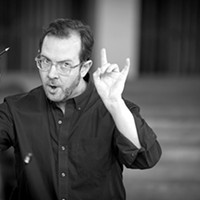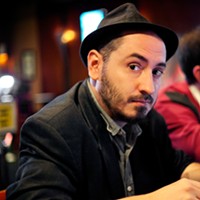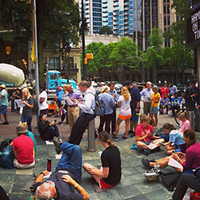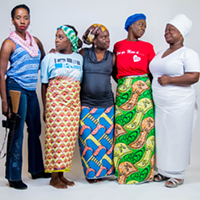Meanwhile, the composer's songs have been sung by Barbara Streisand on multi-platinum albums, by cartoon critters in Shrek, and by Britney Spears, for crissake. Holmes's soundtrack for A Star Is Born won a Grammy Award. Toss in some prime work in TV. He wrote the Emmy Award-winning Remember WENN for AMC.
This week, Holmes's newest play, Thumbs, gets a World Preview opening at Spirit Square. Holmes is in town to see how well his script works on Charlotte's theater audience.
We were able to catch Holmes a couple of weeks ago at his New York office and chat with him about the mad swirl of his career, about Thumbs, and about the medicinal effect of mystery thrillers.
Creative Loafing: Looking over your press bio, I guess lazy and laid-back aren't proper descriptions for Rupert Holmes.
Rupert Holmes: People ask me my hobby, and I say it's sleeping -- and I've really neglected my hobby. I work until about four or five in the morning, and I get up about eight or nine. Then they say, Oh, you're one of those people who doesn't need eight hours of sleep. And I say, I need eight hours of sleep. I just can't afford it. I don't know. I've always wanted to do lots of different things. Somehow, I never got it into my head that I had to necessarily choose. It's an old habit from my early days in the record business. I found the most productive sentence I could say to people was, Yes!
All the different things you do must presuppose that you have an omnivorous interest in things -- such as mysteries.
I do. I'm a wealth of information that is of no use to anyone. If you need to know the entire cast of the first season of The Many Loves of Dobie Gillis, I'm the man to turn to. If it's information that is not particularly vital to anyone's daily life, my brain soaks it up and retains it for decades.
So were you absorbed by reading and consuming mysteries at one point?
Yeah. My love affair with mysteries goes back to when I was like 10 or 11. Because I had to wear glasses when I was eight. This was in the 50s, when if you wore glasses, about 90 percent of your options in life were automatically ruled out for you. So I kind of felt very forlorn, because I was obviously not going to be Flash Gordon or anybody like that. Suddenly I discovered there were these things called mysteries where the hero sometimes wore glasses. Ellery Queen, for example, who was on TV at that time. And he wore glasses!
I loved reading mysteries because it's as if someone has glued a magnet on the inside back cover of the book. If it gets a little slow, you still pull through the book because there's that reward at the end where you find out whodunnit. Kind of like why you might work your way through a lime Tootsie Pop knowing eventually there is a chocolate center that I'm going to get to.
Despite the fact that they seem to involve violence and blood, mysteries are actually very reassuring, especially in our unstable times. You have this universe where, suddenly, the social order has been thrown completely into chaos. My favorite line in Thumbs is baby simple: You're not supposed to kill people.
We count on people behaving the way they should behave. We count on the fact that life, being hard enough to get through as it is, is not going to be shortened by some stupid act. And into this terrible chaos comes the great detective, who sometimes takes the form of Sherlock Holmes or Hercule Poirot and sometimes takes the form of someone quite obscenely innocuous, like Miss Marple or Father Brown. Somehow they see the same information that we see, and they're able to perceive something that we can't get.
And by the end of the book, the murder is avenged, the murderer is punished or dead, and order has been restored. It's a very satisfying feeling, something we don't often get in real life, as current events show. I also love the traditions of mysteries. Then I love to try and see if I can either break the tradition without trying to turn my back on it, or see if I can stretch it and somewhere come up with a new variation.
Well, that's where I'm kind of fascinated with the work I've seen -- Drood and Accomplice. It strikes me that those works almost couldn't be written by someone who was steeped in theater.
I actually was steeped in theater. Even as a young man, I would sit there and say, Ah well, so much has already been done that's so good. Is there something that someone hasn't tried yet?
When I went to Joe Papp and told him about my notion for The Mystery of Edwin Drood, his basic question was, How would you ever do this? And I tried to lay out how I thought it could be done, and when we opened in Central Park, after the very first performance we were sitting in the Delacorte all alone. Joe Papp's there, myself, and the director, Wilford Leach. Joe turned to me and said, Um, it works!
I said, You're just deciding that now? You mean we went six weeks of rehearsal with Betty Buckley and Cleo Laine and George Rose and we got $300,000 worth of sets and now you've decided that the mechanics work? And he said, Well, I just wasn't sure! But the only way we're going to find out was to do it.
Thumbs is really a more traditional mystery comedy. What I realized had not been done a lot in this genre has been that no one has written a Sleuth for women. Most of the thrillers that have been written are for men, and the women in them are usually either the reason for the murder or the victim.
I thought there's such a real gap in the genre. There are male roles in the play, and they're all extremely vital. There are no throwaway roles. However, I do think at the center of the play are two women.
It sounds like you're keeping the fourth wall.
Yeah, I should tell you in advance since you were so adept at sussing out all of that game playing I was doing [in Accomplice]. Unlike a lot of my plays, you needn't go hunting for clues in the playbill.
So how did this thing materialize in Charlotte?
Well, the thing you hope as a playwright is to find somewhere where you can put on a play and entertain the audience and learn about the play. It's as if a play is Alka-Seltzer or Kool-Aid. Until you add water, it doesn't exist. So until you add an audience to a play, there's a lot you don't know about it. So I have tried recently to find a way to open a show out of town without having to really go way, way out of town. And I did Thumbs as a gift to a community theater in New Jersey that does a very, very fine professional job with plays.
And somehow Dan Shoemaker [of Actor's Theatre] found out about it. And he e-mailed me. And I was very, very aware of the production they did of Accomplice, and it was very nicely received by not only yourself but by a number of other writers in the area. So I get this e-mail from Dan saying, What is Thumbs, and we're interested in it. And I said, It's never been performed anywhere. This is just a workshop I'm doing. I'd be glad to share it with you. But I'll tell you what. I'm not going to send you the third act. You can see the third act if you want to do the play. I sent him Acts I and II, and he went nuts. He said, You can't leave me hanging like this. I want to know how this turns out!
Fairly keen interest.
He said, We're doing it. I don't even care if Santa appears in the last act and says, Oh, it was all a dream!'
Has there been any impact on the plays and musicals that you have upcoming on Broadway because of the downturn in the business?
Well, I don't think we've even fully measured yet what it's done to Broadway. I think more shows are going to close that were not planning to close. Kiss Me, Kate looks like it's in trouble. And I'm told that Phantom...PHANTOM I'm talking about now, OK? -- I think it played to 400 people two nights ago.
So will it affect anything? The one I'm finishing right now is The Picture of Dorian Gray, which is again a big, big musical. It's the most epic thing I've created since Drood. What [the downturn] is going to do I can only begin to guess. I think it's going to make any large undertaking -- for a while, at least - very, very difficult. It's not a great time for big theater. It's a good time for us to be focusing on the theater that I love, which is more intimate theater.
In the last few years, the one thing that's been impossible to find is a Broadway theater. The only reason we've waited so long to take Say Goodnight, Gracie to New York is we just haven't been able to find the right theater for a one-man show. Really, you only have about five theaters like that -- and they were all booked forever. So we were going to open in March, and my guess is, knock wood, we will. But no sooner. We're not going to take advantage of other people's hardship right now.
Reviews
Shortcuts to Divorce
If you're a private detective, armed with all the mighty miniaturized surveillance electronics you can offer to a suspicious and spiteful clientele, happy marriages are the chief threat to your happiness. We see this all too clearly in Drift, a mordant little satire by Jon Tuttle that opened at the Afro-Am last week in a sharp new BareBones Theatre Group production.
All seven of the performers, under James Yost's quirky direction, are keenly alert throughout the evening -- and almost always credible. But clearly the shamus, Lee, gets the tastiest lines as he tries his level best to demolish three marriages.
Lee can pour venom into a young husband's ear at a neighborhood tavern while buying him beers. Such generosity might not be forthcoming were Lee not on retainer, watching the moves of a cheating wife seducing the bartender. And when he shows a sloshed vindictive wife the fruits of his labors, Lee can impressively council his client on how she can best cash in on her legal advantage.
Bobby Tyson feasts on the role, heating up Lee's cynical philosophizing to a stand-up comedy dazzle. Marshall Case is marvelously understated as Ms. Sloshed's gracious husband, Chad Calvert is delighfully decadent as the barkeep, and Yost teams beautifully with Lorraine Larocque as the suggestible young husband and his virtuous waitressing wife.
All goes rather well until Tuttle reaches for his resolutions. The reconciliation between the young marrieds is trite, and the final confrontation between Lee and his bitchy prey is pointless and opaque. Only the nuanced, explosive scene between the sloshed wife and her indulgent husband digs deeply and meaningfully, showing us what Tuttle is truly capable of.
Definitely an auspicious beginning for BareBones' season.
NC Dance Theatre also scored impressively with its opener, Cinderella. I sort of dreaded the anticlimactic wedding between the liberated drudge and her prince. But Jean-Pierre Bonnefoux's choreography was miraculously wedded to Prokofiev's beguiling score, certainly close to the apex of his achievement. After the bravura of Edgar Vardanian's solo as the Prince and Traci Gilchrest's as the Cind, Kati Hanlon's blessing of the couple as fairy godmother was magical.
Set designer Alain Vaes and costumer Christina Giannini delivered lavishly. The precocity of the young DancePlace students was as stunning as Nate McGaha's lighting. Charlotte Symphony, under David Tang's baton, was colorful and lyrical all evening long.
Additional polish is still recommended. As the bell tolled midnight at the royal ball and lights dramatically dimmed, it was embarrassing to realize that the fairy godmother had never decreed Cindy's curfew. A really puzzling omission when I recalled the tedious sequence of fairy dances that preceded her highness's first ride in her signature pumpkin.
But when I saw that splendiferous wedding scene, I couldn't help swelling with pride at the thought that NCDT will be touring with this production for years to come.
Speaking of Arts_performance.html
-

Sailing With Hamlet
Jul 20, 2005 -
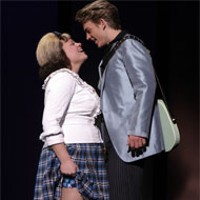
Proud To Be Plump
Jul 6, 2005 -
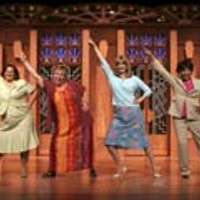
Putting The Sell In Cellulite
Jun 29, 2005 - More »
Latest in Performing Arts
More by Perry Tannenbaum
Calendar
-

NEW WINDOW GALLERY-Pat Rhea-ACRYLIC PAINTINGS-April 05-30 2024 VALDESE, NC 28690 @ New Window Gallery/Play It Again Records
- Through April 30, 12 p.m.
-
Derek Hough - Symphony Of Dance @ Ovens Auditorium
-

"Blood Residue Analysis of Paleoamerican Stone Tools in the Carolinas" @ Native American Studies Center
- Fri., April 26, 12-1 p.m.
-

ARTS RENAISSANCE, a GALA supporting the ARTS in South Carolina @ the Columbia Museum of ART
-
 The Piano Guys @ Ovens Auditorium
The Piano Guys @ Ovens Auditorium
-
Charlotte ink 7
Behind the pain with a trio of the Queen City's finest tattoo artists
-
The death of CAST 5
What really happened to Charlotte's beloved experimental theater company?
-
Jessica Moss Makes the Gantt Center a Safe Zone for Local Artists 2
Flipping the script

